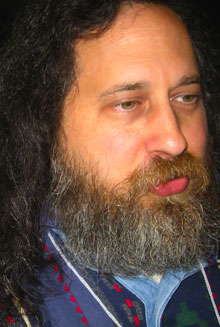Um debate inédito durante o 7º FISL, nessa sexta-feira, revelou uma tentativa de aproximação da gigante do software Microsoft com a comunidade do código aberto. No encontro paralelo promovido pela Infomedia TV, a empresa indicou uma mudança na sua estratégia de mercado para buscar a coexistência entre o seu software comercial e o software livre. Leia no Terra.
 Em resposta à participação da Microsoft durante a 7ª edição do FISL, conversei com Richard Stallman, guru do movimento pelo software livre, que acredita que a tentativa de aproximação da empresa com a comunidade é uma grande farsa.
Em resposta à participação da Microsoft durante a 7ª edição do FISL, conversei com Richard Stallman, guru do movimento pelo software livre, que acredita que a tentativa de aproximação da empresa com a comunidade é uma grande farsa.
Do you think this is a move to lure the community?
I don't think they are going to fool the community into forgetting what Microsoft licenses say, and i don't think they believe that they could. It's more subtle than that. By focussing the attention on "lets work together to make your software work with our software" they distract people from the issue of freedom. You see, if you think it's just about making software work well, then what they are suggesting might seem logical, might seem appropriate and desirable.
If you participate in what they are suggesting, then you start focussing more and more on just making various programs work well, including their proprietary programs, and focussing less and less on freedom. So it's a sneaky way of getting the people in our community to make the use of their proprietary software more convenient because our applications will work with it.
And meanwhile, they are paying hardware companies not to let us write free software that works on it. So basically they are saying "cooperate with us when it helps us, but we won't let people cooperate with you when it helps freedom."
Seeing that Microsoft has a huge user base, don't you think that interoperability would be a first step?
It depends what kind of interoperability. You see, there is some use in free softwares running on Windows, we just have to realize is that it's a side issue. That what we really want people to do is stop using Windows, stop using Mac OS, stop using UNIX and other non-free systems. People shouldn't be using them.
(...)
Now the reason they get this choice - they can allow their software to interoperate or they can stop it -, is because they have power over the users. They decide what goes in the software, the users can't control it. Because they make non-free software, they can choose to have their software be interoperable. The only question is "will people boycott them?" And they think the answer is no.
But note that if we, free software developers, were the majority, we could not impose non-interoperabilty because the users are in control. We just develop the software and make it available to the users - the users control where it goes from there. If the users want it interoperable, they will make it interoperable. We don't have power the way Microsoft does, and that is why our software is ethical and their software is not.

